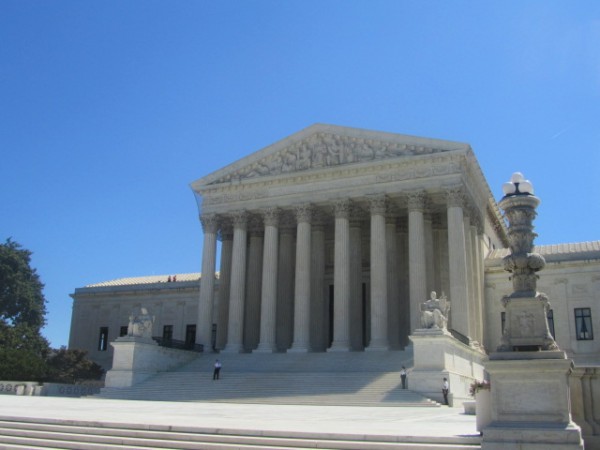
- Details
- By Native News Online Staff
WASHINGTON — American Indian tribes in California’s Klamath Basin praised Monday’s decision by the United States Supreme Court not to hear the Klamath Project irrigators’ Fifth Amendment water rights case, Baley v. United States.
By not hearing the case, the Supreme Court upheld the Klamath Tribes’ treaty water rights as the most senior water rights in the Klamath Basin. These water rights are critical to protect the tribes’ fisheries and traditional way of life.
“Bailey is an important affirmation of our tribe’s priority right to the water to sustain our fisheries,” Hoopa Valley Tribal Chairman Byron Nelson Jr. said on Monday.
Klamath Project irrigators sought nearly $30 million in compensation from the United States government for the Bureau of Reclamation’s curtailment of water deliveries during a severe drought in 2001.
In 2017, the US Court of Claims ruled that the Klamath Tribes and downriver Klamath Basin tribes have senior water rights that take priority over those of the Project irrigators.
In 2019, the US Court of Appeals affirmed that decision and went on to declare that the Klamath Tribes’ water rights include Upper Klamath Lake waters and that, in 2001, the Klamath Basin tribes were entitled to—at the least—the amount of water required to meet Endangered Species Act requirements.
With the Supreme Court’s refusal to review the lower court’s decision, the case is closed, and the decisions from the lower courts stand.
“We’re pleased to have this case put to rest and the seniority of the Klamath Tribes’ water rights recognized and reinforced. The courts in this case were correct about our treaty rights, which include protecting and sustaining the endangered C’wam and Koptu in Klamath Lake. We look forward to healing and restoring our tribal fisheries,” Klamath Tribes Chairman Don Gentry stated.
Although the decision hinged on recognition of the senior tribal water rights, the case technically was between the irrigators and the United States.The Klamath Tribes participated as amicus curiae (friend of the court) to assure that the courts did not ignore the role of tribal water rights.
The Klamath Tribes were represented by the Native American Rights Fund.
“We were proud to represent the Klamath Tribes throughout this 19-year-long litigation. The law is very clear about the Klamath Tribes’ senior water rights in the region. The courts have been very clear as well. We are glad the courts reached the right outcome in this case and that tribal rights and sovereignty have been affirmed,” NARF Executive Director John Echohawk said.
Learn more about the Bailey v. United States case.
More Stories Like This
NCAI Passes Two Emergency Resolutions on Immigration Enforcement ActivitiesChickasaw Lighthorse Police Officer named Indian Country Law Enforcement Officer of the Year
Indian Gaming Association Rallies Broad Coalition Against Sports Event Contracts It Calls Illegal Threat to Tribal Sovereignty
Navajo Resources and Development Committee Issues Notice on Livestock Inspection Requirements
American Prairie, Tribal Coalition Files Protest Over Rescinded Grazing Rights
Help us defend tribal sovereignty.
At Native News Online, our mission is rooted in telling the stories that strengthen sovereignty and uplift Indigenous voices — not just at year’s end, but every single day.
Because of your generosity last year, we were able to keep our reporters on the ground in tribal communities, at national gatherings and in the halls of Congress — covering the issues that matter most to Indian Country: sovereignty, culture, education, health and economic opportunity.
That support sustained us through a tough year in 2025. Now, as we look to the year ahead, we need your help right now to ensure warrior journalism remains strong — reporting that defends tribal sovereignty, amplifies Native truth, and holds power accountable.
 The stakes couldn't be higher. Your support keeps Native voices heard, Native stories told and Native sovereignty defended.
The stakes couldn't be higher. Your support keeps Native voices heard, Native stories told and Native sovereignty defended.
Stand with Warrior Journalism today.
Levi Rickert (Potawatomi), Editor & Publisher

